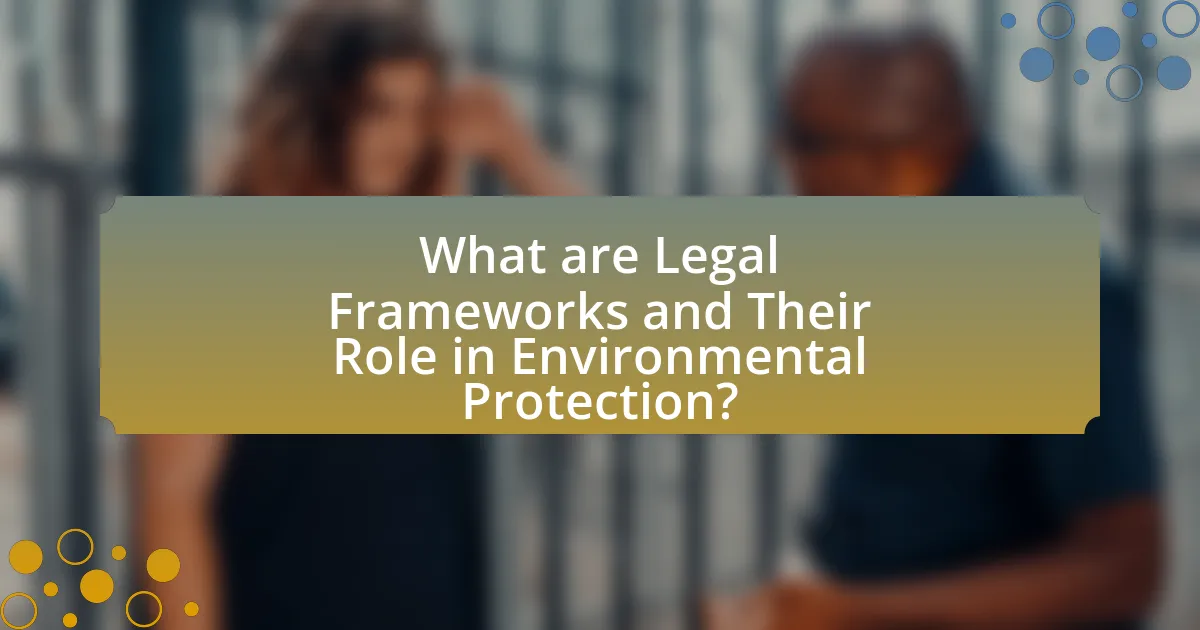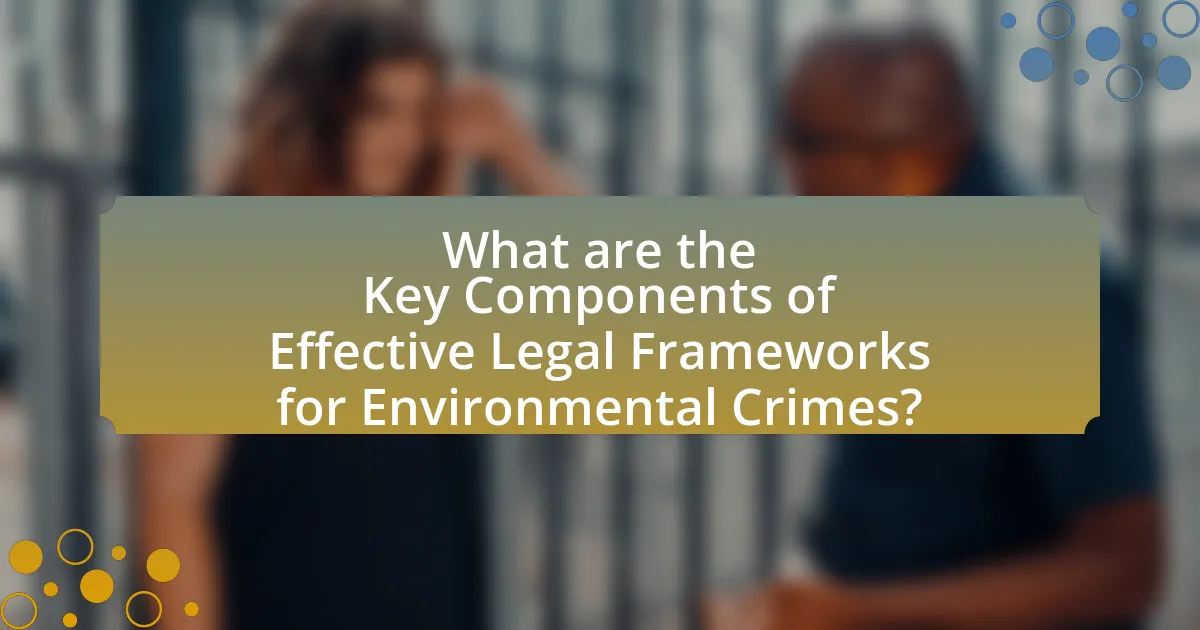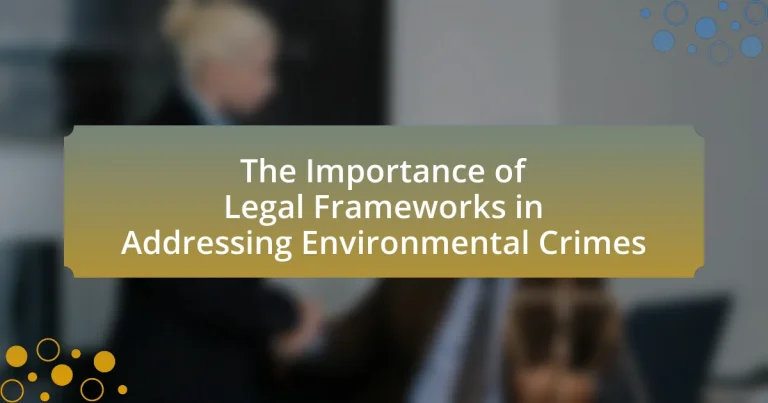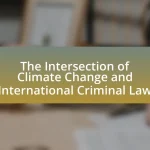Legal frameworks are structured systems of laws and regulations that govern human activities to protect the environment. This article examines the critical role these frameworks play in addressing environmental crimes, including their definitions, enforcement mechanisms, and the types of offenses they cover. It highlights the importance of clear legal definitions, stringent penalties, and public participation in enhancing accountability and compliance. Additionally, the article discusses the challenges faced in enforcing environmental laws, the influence of international treaties on national legislation, and best practices for improving legal frameworks to effectively combat environmental degradation.

What are Legal Frameworks and Their Role in Environmental Protection?
Legal frameworks are structured systems of laws and regulations designed to govern human activities and protect the environment. Their role in environmental protection includes establishing legal standards, enforcing compliance, and providing mechanisms for accountability and redress. For instance, international agreements like the Paris Agreement set binding commitments for countries to reduce greenhouse gas emissions, while national laws regulate pollution and resource management. These frameworks are essential for mitigating environmental degradation, as they create a legal basis for action against violators, thereby promoting sustainable practices and safeguarding ecosystems.
How do legal frameworks address environmental crimes?
Legal frameworks address environmental crimes by establishing laws and regulations that define specific offenses, set penalties, and outline enforcement mechanisms. These frameworks, such as the Clean Air Act and the Clean Water Act in the United States, provide clear guidelines for what constitutes environmental harm and the legal repercussions for violations. For instance, the Environmental Protection Agency (EPA) enforces these laws, ensuring compliance through inspections and penalties, which can include fines or imprisonment for offenders. Additionally, international agreements like the Paris Agreement create binding commitments for countries to reduce environmental damage, demonstrating a global approach to addressing these crimes.
What types of environmental crimes are covered by legal frameworks?
Legal frameworks cover various types of environmental crimes, including pollution, illegal dumping of hazardous waste, deforestation, wildlife trafficking, and violations of environmental regulations. These crimes are addressed through specific laws and regulations that aim to protect natural resources and public health. For instance, the Clean Air Act and the Clean Water Act in the United States establish standards to prevent air and water pollution, while the Endangered Species Act protects threatened wildlife from illegal trade and habitat destruction. Such legal measures are essential for enforcing accountability and promoting sustainable practices.
How do legal definitions of environmental crimes vary across jurisdictions?
Legal definitions of environmental crimes vary significantly across jurisdictions, reflecting differences in legal frameworks, cultural values, and enforcement priorities. For instance, the United States defines environmental crimes under statutes like the Clean Water Act and the Clean Air Act, focusing on specific pollutants and regulatory violations. In contrast, the European Union employs a broader approach through directives that encompass various environmental offenses, including biodiversity loss and waste management violations. Additionally, countries like Brazil have unique legal provisions that address deforestation and illegal logging, emphasizing the protection of the Amazon rainforest. These variations illustrate how local legal contexts shape the interpretation and enforcement of environmental laws, impacting the effectiveness of environmental protection efforts globally.
Why are legal frameworks essential for combating environmental crimes?
Legal frameworks are essential for combating environmental crimes because they establish clear definitions, regulations, and penalties that deter illegal activities. These frameworks provide the necessary legal authority for enforcement agencies to investigate and prosecute offenders, ensuring accountability. For instance, the United Nations Environment Programme highlights that countries with robust environmental laws experience lower rates of deforestation and pollution, demonstrating the effectiveness of legal measures in protecting ecosystems.
What are the consequences of inadequate legal frameworks on environmental protection?
Inadequate legal frameworks on environmental protection lead to increased pollution, habitat destruction, and biodiversity loss. Without robust laws, industries often exploit natural resources irresponsibly, resulting in significant environmental degradation. For instance, the lack of stringent regulations has contributed to the Amazon rainforest’s deforestation, which has accelerated due to illegal logging and land conversion for agriculture. According to a study by the World Resources Institute, approximately 17% of the Amazon has been lost since the 1970s, primarily due to insufficient legal enforcement. Furthermore, inadequate frameworks hinder the ability to hold polluters accountable, allowing harmful practices to persist unchecked, which exacerbates climate change and threatens public health.
How do legal frameworks promote accountability among corporations and individuals?
Legal frameworks promote accountability among corporations and individuals by establishing clear regulations and consequences for non-compliance. These frameworks define legal obligations, such as environmental standards, and impose penalties for violations, thereby incentivizing adherence. For instance, the Clean Air Act in the United States mandates specific emissions limits for industries, and failure to comply can result in substantial fines and legal action. This creates a deterrent effect, encouraging corporations to operate within legal boundaries to avoid financial and reputational damage. Additionally, legal frameworks facilitate transparency through reporting requirements, allowing stakeholders to hold corporations accountable for their environmental impact.

What are the Key Components of Effective Legal Frameworks for Environmental Crimes?
Key components of effective legal frameworks for environmental crimes include clear definitions of offenses, stringent penalties, enforcement mechanisms, and public participation. Clear definitions ensure that environmental crimes are unambiguously identified, which is essential for effective prosecution. Stringent penalties act as a deterrent against violations, with studies indicating that harsher penalties correlate with lower rates of environmental offenses. Enforcement mechanisms, such as specialized agencies and trained personnel, are crucial for monitoring compliance and investigating violations. Public participation fosters transparency and accountability, allowing communities to engage in environmental governance, which has been shown to enhance the effectiveness of legal frameworks.
What laws and regulations are typically included in these frameworks?
Legal frameworks addressing environmental crimes typically include laws and regulations such as the Clean Air Act, the Clean Water Act, and the Resource Conservation and Recovery Act in the United States. These laws establish standards for air and water quality, regulate hazardous waste management, and impose penalties for violations. For instance, the Clean Air Act sets limits on air pollutants to protect public health and the environment, while the Clean Water Act regulates discharges of pollutants into U.S. waters, ensuring the protection of aquatic ecosystems. The Resource Conservation and Recovery Act governs the disposal of solid and hazardous waste, promoting environmentally sound waste management practices. These frameworks are essential for enforcing compliance and deterring environmental violations.
How do international treaties influence national legal frameworks?
International treaties significantly influence national legal frameworks by establishing binding obligations that countries must incorporate into their domestic laws. For instance, treaties like the Paris Agreement require nations to develop and implement policies aimed at reducing greenhouse gas emissions, thereby shaping national environmental legislation. The incorporation of these international commitments often leads to the creation of specific laws, regulations, and enforcement mechanisms that align with treaty obligations, ensuring compliance and accountability. This process is evident in countries that have enacted laws to meet their commitments under various environmental treaties, demonstrating the direct impact of international agreements on national legal systems.
What role do local laws play in addressing environmental crimes?
Local laws play a crucial role in addressing environmental crimes by establishing specific regulations and penalties that deter harmful activities. These laws empower local authorities to enforce compliance with environmental standards, thereby protecting ecosystems and public health. For instance, local ordinances can impose fines for illegal dumping or pollution, which directly incentivizes businesses and individuals to adhere to sustainable practices. Additionally, local laws often reflect the unique environmental challenges of a community, allowing for tailored responses that are more effective than broader national regulations. This localized approach has been shown to enhance enforcement efforts, as seen in cities that have successfully reduced waste through stringent local regulations.
How do enforcement mechanisms function within legal frameworks?
Enforcement mechanisms within legal frameworks function by ensuring compliance with laws through various tools and processes. These mechanisms include regulatory agencies, judicial systems, and law enforcement bodies that monitor, investigate, and penalize violations. For instance, the Environmental Protection Agency (EPA) in the United States employs inspectors to assess compliance with environmental regulations and can impose fines or initiate legal action against violators. This structured approach is essential for maintaining accountability and deterring future infractions, thereby reinforcing the effectiveness of legal frameworks in addressing environmental crimes.
What are the challenges faced in enforcing environmental laws?
Enforcing environmental laws faces significant challenges, including insufficient funding, lack of political will, and inadequate regulatory frameworks. Insufficient funding limits the capacity of enforcement agencies to monitor compliance and conduct investigations effectively. Lack of political will often results in weak enforcement actions, as governments may prioritize economic growth over environmental protection. Additionally, inadequate regulatory frameworks can create loopholes that hinder effective enforcement, allowing violators to evade accountability. For instance, a report by the United Nations Environment Programme highlights that many countries lack the necessary legal instruments to address environmental crimes comprehensively, leading to ineffective enforcement.
How can technology enhance the enforcement of environmental regulations?
Technology can enhance the enforcement of environmental regulations by providing advanced monitoring and data analysis tools. These tools, such as satellite imagery and remote sensing, enable real-time tracking of environmental changes and illegal activities, allowing regulatory agencies to respond swiftly. For instance, the European Space Agency’s Copernicus program offers high-resolution satellite data that helps monitor deforestation and pollution levels, facilitating compliance checks and enforcement actions. Additionally, data analytics platforms can process vast amounts of environmental data to identify patterns of non-compliance, thereby improving the efficiency of inspections and investigations.

What are the Challenges and Limitations of Current Legal Frameworks?
Current legal frameworks face significant challenges and limitations in effectively addressing environmental crimes. These frameworks often lack the necessary specificity to cover emerging environmental issues, resulting in gaps that allow for exploitation and harm. For instance, many laws are outdated and do not account for new technologies or practices that contribute to environmental degradation, such as illegal e-waste dumping or unregulated carbon emissions. Additionally, enforcement mechanisms are frequently weak, with insufficient resources allocated for monitoring and prosecution, leading to low rates of accountability for offenders. According to a report by the United Nations Environment Programme, only 30% of countries have adequate legal provisions to combat environmental crimes, highlighting the inadequacy of existing laws. Furthermore, jurisdictional challenges complicate cross-border environmental crime enforcement, as differing national laws can hinder coordinated action. These factors collectively undermine the effectiveness of legal frameworks in protecting the environment and ensuring justice for violations.
What obstacles hinder the effectiveness of legal frameworks in addressing environmental crimes?
Legal frameworks face several obstacles that hinder their effectiveness in addressing environmental crimes, including inadequate enforcement mechanisms, lack of resources, and insufficient public awareness. Inadequate enforcement mechanisms result in weak penalties and inconsistent application of laws, which diminishes deterrence against environmental violations. Additionally, many regulatory bodies lack the necessary funding and personnel to monitor compliance effectively, leading to underreporting and unaddressed infractions. Furthermore, insufficient public awareness about environmental laws and the consequences of violations limits community engagement and advocacy, which are crucial for holding offenders accountable. These factors collectively undermine the legal frameworks designed to protect the environment.
How do political and economic factors impact the enforcement of environmental laws?
Political and economic factors significantly influence the enforcement of environmental laws by shaping regulatory priorities and resource allocation. Governments may prioritize economic growth over environmental protection, leading to lax enforcement of laws when industries contribute substantially to the economy. For instance, in countries where fossil fuel industries are major economic drivers, environmental regulations may be weakened to attract investment, as seen in the United States during the Trump administration, which rolled back numerous environmental protections to boost economic activity. Additionally, political stability and public support for environmental initiatives can enhance enforcement; countries with strong democratic institutions and active civil societies tend to have more robust environmental law enforcement. Conversely, in politically unstable regions, enforcement may be inconsistent or ignored altogether, as seen in parts of Brazil where illegal deforestation has surged amid political turmoil.
What role does public awareness play in the effectiveness of legal frameworks?
Public awareness significantly enhances the effectiveness of legal frameworks by fostering compliance and encouraging community engagement in environmental protection. When the public is informed about environmental laws and the consequences of violations, they are more likely to adhere to regulations and report infractions. For instance, studies have shown that communities with higher levels of environmental awareness demonstrate greater participation in conservation efforts and support for legal measures aimed at protecting natural resources. This correlation indicates that informed citizens can act as watchdogs, holding violators accountable and thereby reinforcing the legal framework’s authority.
How can legal frameworks be improved to better address environmental crimes?
Legal frameworks can be improved to better address environmental crimes by incorporating stricter penalties, enhancing enforcement mechanisms, and promoting international cooperation. Stricter penalties deter potential offenders; for instance, countries with severe fines and imprisonment for environmental violations, such as Germany, have seen a reduction in such crimes. Enhancing enforcement mechanisms involves increasing funding and resources for environmental agencies, which can lead to more effective monitoring and prosecution of offenders. Additionally, promoting international cooperation through treaties and agreements, like the Paris Agreement, facilitates shared responsibility and accountability among nations, thereby strengthening the global response to environmental crimes.
What best practices can be adopted from successful legal frameworks worldwide?
Best practices that can be adopted from successful legal frameworks worldwide include the establishment of clear definitions of environmental crimes, the implementation of strict penalties for violations, and the promotion of international cooperation. Clear definitions, as seen in the European Union’s Environmental Crime Directive, help ensure consistent enforcement and understanding of what constitutes an environmental offense. Strict penalties, such as those enforced in countries like Australia, deter potential violators and reinforce the seriousness of environmental protection. International cooperation, exemplified by treaties like the Paris Agreement, facilitates information sharing and joint enforcement efforts, enhancing the effectiveness of legal frameworks in combating environmental crimes.
How can stakeholder engagement enhance the effectiveness of legal frameworks?
Stakeholder engagement enhances the effectiveness of legal frameworks by fostering collaboration and ensuring that diverse perspectives are considered in the development and implementation of laws. Engaging stakeholders, such as community members, NGOs, and industry representatives, leads to more comprehensive legal frameworks that address the specific needs and concerns of affected parties. For instance, research by the World Resources Institute highlights that inclusive stakeholder participation in environmental policy-making results in more effective enforcement and compliance, as stakeholders are more likely to support and adhere to regulations they helped shape. This collaborative approach not only improves the relevance of legal frameworks but also increases public trust and accountability, ultimately leading to better outcomes in addressing environmental crimes.
What practical steps can individuals and organizations take to support legal frameworks in combating environmental crimes?
Individuals and organizations can support legal frameworks in combating environmental crimes by actively participating in advocacy efforts to strengthen environmental laws and regulations. This includes lobbying for stricter penalties for offenders, promoting transparency in environmental governance, and engaging in public awareness campaigns that highlight the importance of legal protections for the environment.
Additionally, individuals can report environmental violations to authorities, while organizations can collaborate with legal experts to provide resources and training on compliance with environmental laws. Research indicates that community involvement in legal processes enhances enforcement effectiveness, as seen in the success of citizen lawsuits in the United States, which have led to significant legal precedents in environmental protection.


